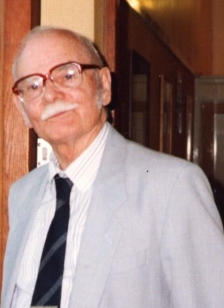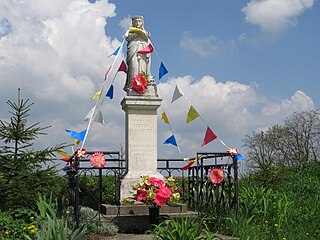Related Research Articles

Gustav Theodore Holst was an English composer, arranger and teacher. Best known for his orchestral suite The Planets, he composed many other works across a range of genres, although none achieved comparable success. His distinctive compositional style was the product of many influences, Richard Wagner and Richard Strauss being most crucial early in his development. The subsequent inspiration of the English folksong revival of the early 20th century, and the example of such rising modern composers as Maurice Ravel, led Holst to develop and refine an individual style.

Sir Henry Walford Davies was an English composer, organist, and educator who held the title Master of the King's Music from 1934 until 1941. He served with the Royal Air Force during the First World War, during which he composed the Royal Air Force March Past, and was music adviser to the British Broadcasting Corporation, for whom he gave commended talks on music between 1924 and 1941.

Sir Granville Ransome Bantock was a British composer of classical music.

Gregynog is a large country mansion in the village of Tregynon, 4 miles (6.4 km) northwest of Newtown in the old county of Montgomeryshire, now Powys in mid Wales. There has been a settlement on the site since the twelfth century. From the fifteenth to the nineteenth century it was the home of the Blayney and Hanbury-Tracy families. In 1960 it was transferred to the University of Wales as a conference and study centre by Margaret Davies, granddaughter of the nineteenth century industrial magnate and philanthropist, David Davies 'Top Sawyer' of Llandinam.

A Sea Symphony is an hour-long work for soprano, baritone, chorus and large orchestra written by Ralph Vaughan Williams between 1903 and 1909. The first and longest of his nine symphonies, it was first performed at the Leeds Festival in 1910 with the composer conducting, and its maturity belies the relatively young age – 30 – when he began sketching it. Moreover, it is one of the first symphonies in which a chorus is used throughout as an integral part of the texture and it helped set the stage for a new era of symphonic and choral music in Britain during the first half of the 20th century. It was never numbered.

Harold Edwin Darke was an English composer and organist. He is particularly known for his choral compositions, which are an established part of the repertoire of Anglican church music. Darke had a fifty-year association with the church of St Michael, Cornhill, in the City of London.
Rutland Boughton was an English composer who became well known in the early 20th century as a composer of opera and choral music. He was also an influential communist activist within the Communist Party of Great Britain (CPGB).

Edgar Leslie Bainton was a British-born, latterly Australian-resident composer. He is remembered today mainly for his liturgical anthem And I saw a new heaven, a popular work in the repertoire of Anglican church music, but during recent years Bainton's other musical works, neglected for decades, have been increasingly available in commercial recordings.

Ian Parrott was a prolific Anglo-Welsh composer and writer on music. His distinctions included the first prize of the Royal Philharmonic Society for his symphonic poem Luxor, and commissions by the BBC and Yale University, and for many leading British musicians. In 1958 his cor anglais concerto was first performed at Cheltenham Festival, and in 1963 his cello concerto was given by William Pleeth and the Hallé Orchestra – both concertos were conducted by Sir John Barbirolli.
Margaret Sidney Davies, was a Welsh art collector and patron of the arts. With her sister Gwendoline, she bequeathed a total of 260 works, particularly strong in Impressionist and 20th-century art, which formed the basis of the present-day National Museum Wales' international collection. The sisters started the Gregynog Press in 1922 and the Gregynog Music Festival in 1933.
The Choral Symphony is a work by Gustav Holst for soprano soloist, chorus, and orchestra in a setting of verses by John Keats. Written in 1923–24, it was premiered in Leeds Town Hall on October 7, 1925, conducted by Albert Coates with Dorothy Silk as soloist. The same performers gave the work's second performance three weeks later in Queen's Hall, London. The work is sometimes known as the First Choral Symphony, although a planned 'second Choral Symphony' never progressed beyond some uncompleted sketches.
A Choral Fantasia, Op. 51, is a work Gustav Holst composed in 1930, setting a selection of verses from Robert Bridges' Ode to Music. Featuring a concertante organ part, A Choral Fantasia also involves a soprano soloist, chorus, string orchestra, brass and percussion.

Psalm 115 is the 115th psalm of the Book of Psalms, beginning in English in the King James Version: "Not unto us, O LORD, not unto us, but unto thy name give glory". It is part of the Egyptian Hallel sequence in the fifth division of the Book of Psalms.
Roderick Gregory Coleman Williams OBE is a British baritone and composer.
This is a summary of 1925 in music in the United Kingdom.
Dora Herbert Jones was a Welsh administrator and singer. She began singing while in school and continued doing so while studying at the University College of Wales. Jones was Herbert Lewis' secretary and organised his election campaign in the 1918 general election. She also worked for Viscount Wimborne in Ireland and then at the National Library of Wales. From 1927 to 1942, Jones worked at Gregynog Press and organised the four-day Gregynog Music Festival from 1933 to 1938. She was vice-president and later president of the Welsh Folk Song Society and performed and interpreted folk songs on radio and television. Collections connected to Jones' life are held in both the National Library of Wales and the St Fagans National Museum of History.
Kenneth Harding was a violist in the BBC Symphony Orchestra for thirty-five years and a British composer, composing primarily for viola.

"This Have I Done for My True Love", or "Tomorrow Shall Be My Dancing Day", Op. 34, no. 1 [H128], is a motet or part song composed in 1916 by Gustav Holst. The words are taken from an ancient carol, and the music is so strongly influenced by English folk music that it has sometimes been mistaken for a traditional folk song itself. It has often been described as a small masterpiece.
Max Bruch composed a number of choral works that were, during his lifetime, judged to be his most successful pieces. Instrumental music makes up only about a third of Bruch’s total output, while vocal music forms a considerably larger proportion. These works are described variously as oratorios and cantatas. His oratorios are generally held to represent the best of his vocal writing. Some were of a religious character but many were based on mythological themes.
References
- ↑ "O Spiritual Pilgrim, for soprano & chorus, H. 188". AllMusic . Retrieved 30 April 2020.
- ↑ "This I have done for my true love - part songs by Gustav Holst" (PDF). Hyperion Records . Retrieved 30 April 2020.
- ↑ Mary Christison Huismann (26 April 2011). Gustav Holst: A Research and Information Guide. Routledge. pp. 96–. ISBN 978-1-135-84526-1.
- ↑ Oliver Fairclough (2007). 'Things of Beauty': What Two Sisters Did for Wales. National Museums & Galleries of Wales. p. 130. ISBN 978-0-7200-0581-3.
- ↑ The Anglo-Welsh Review. Dock Leaves Press. 1965. p. 92.
- ↑ Alan Gibbs (2000). Holst Among Friends. Thames. p. 135. ISBN 9780905210599.
- ↑ Ian Parrott (1 January 1969). The spiritual pilgrims. C. Davies. p. 144. ISBN 9780783773025.
- ↑ Radio Times. G. Newnes. 1938.
- ↑ National Library of Wales (1961). 1961 Annual Report of the National Library of Wales. National Library of Wales. p. 24.
- ↑ "File NLW MS 18121E. - Holograph music manuscripts of Sir (Henry) Walford Davies, and a song 'for Gregynog' beginning 'O, spiritual pilgrim, rise' by Holst". National Library of Wales. Archived from the original on 9 August 2020. Retrieved 30 April 2020.